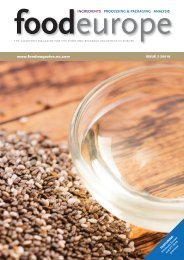issue_2_2017_rev2
Create successful ePaper yourself
Turn your PDF publications into a flip-book with our unique Google optimized e-Paper software.
54<br />
analysis & control<br />
increase ‘healthy’ life expectancy.<br />
Nutrition and diet are well<br />
evidenced in their ability to not<br />
only alter life expectancy but also<br />
quality of life; with good diets<br />
helping people to stay well and<br />
active, for longer.<br />
Aging brings changes in body<br />
composition with loss of strength<br />
and muscle mass, loss of bone<br />
mass, impairments in our digestive<br />
functions, as well as changes to<br />
dental health. Risk of chronic<br />
diseases like heart disease, stroke,<br />
dementia and osteoporosis all<br />
increase. Changes in skin mean<br />
that less vitamin D is produced,<br />
leaving people vulnerable to bone<br />
loss and placed at further risk due<br />
to vitamin D deficiency.<br />
Diet plays a critical role in health<br />
at every life stage and as we age,<br />
what we eat not only affects the<br />
length of life, but also the risk of<br />
developing chronic diseases like<br />
dementia or heart disease in<br />
addition to mood, energy levels<br />
and body composition. A good diet<br />
helps the body recover quickly<br />
from injury or illness and helps to<br />
preserve muscles and bones.<br />
Hydration is crucial too; healthy<br />
hydration levels reduce the risk of<br />
cancer, kidney stones and heart<br />
disease while dehydration doubles<br />
the risk of death from a stroke.<br />
News: Supplementation with B<br />
vitamins may help as an<br />
adjunctive treatment for<br />
schizophrenia<br />
A new systematic review and<br />
meta-analysis reports adjunctive<br />
treatment with B vitamins resulted<br />
in shorter duration of<br />
schizophrenic episodes. The study<br />
covered 18 randomised controlled<br />
trials (RCTs) with 832<br />
schizophrenic patients. Vitamins<br />
B6 (pyrodoxine), B9 (folic acid)<br />
and B12 (cobalamin)<br />
supplementation were used in the<br />
studies.<br />
Schizophrenia is a common, costly,<br />
long-term illness effecting around<br />
1% of the population.<br />
Schizophrenia is a type of<br />
psychosis. Sufferers have difficulty<br />
in distinguishing their own<br />
thoughts and ideas from reality.<br />
They can suffer from<br />
hallucinations, delusions, muddled<br />
thoughts and dramatic behavioural<br />
changes. Sadly, the symptoms are<br />
largely unresponsive to<br />
antipsychotic treatments.<br />
A systematic review carried out in<br />
2013 indicated that adjunctive<br />
treatment with micronutrients,<br />
including minerals and vitamins<br />
can be beneficial to people with<br />
psychiatric disorders. In the case<br />
of B vitamins, it is thought their<br />
role in the biosynthesis of proteins<br />
involved with neuronal growth in<br />
repair could be helpful. A specific,<br />
very recent meta-analysis in<br />
patients with depression<br />
supported the adjunctive use of<br />
methyl folate, EPA/DHA and<br />
vitamin D to help reduce<br />
depressive symptoms. It has also<br />
been suggested that the beneficial<br />
effect of certain vitamin and<br />
minerals, in terms of reducing<br />
neuroinflammation and oxidative<br />
stress, may be helpful in delaying<br />
the onset and relapse of<br />
schizophrenia.<br />
In the new study, the combined B<br />
vitamins 6, 9 and 12 had a<br />
beneficial effect on total<br />
schizophrenia symptom scores<br />
with the best results obtained in<br />
patients who had only recently<br />
developed symptoms. Neither<br />
anti-oxidant vitamins (C and E) nor<br />
minerals showed any significant<br />
benefits in comparison with<br />
Changes in skin mean<br />
that less vitamin D is<br />
produced, leaving<br />
people vulnerable to<br />
bone loss and placed at<br />
further risk due to<br />
vitamin D deficiency<br />
www.foodmagazine.eu.com <strong>issue</strong> two | <strong>2017</strong>
















